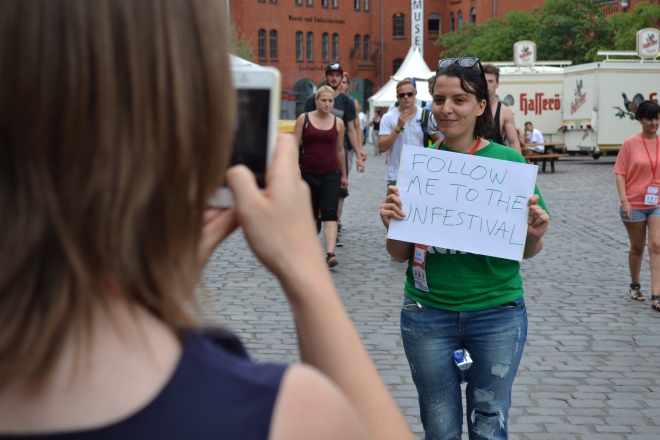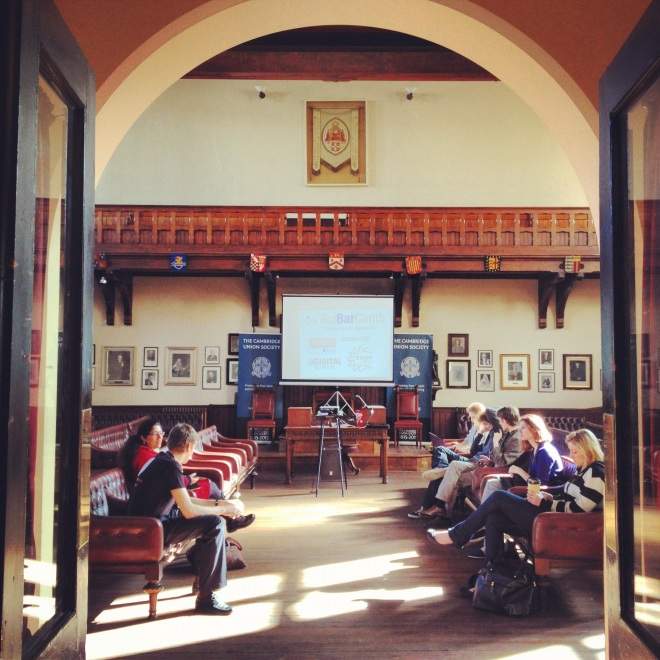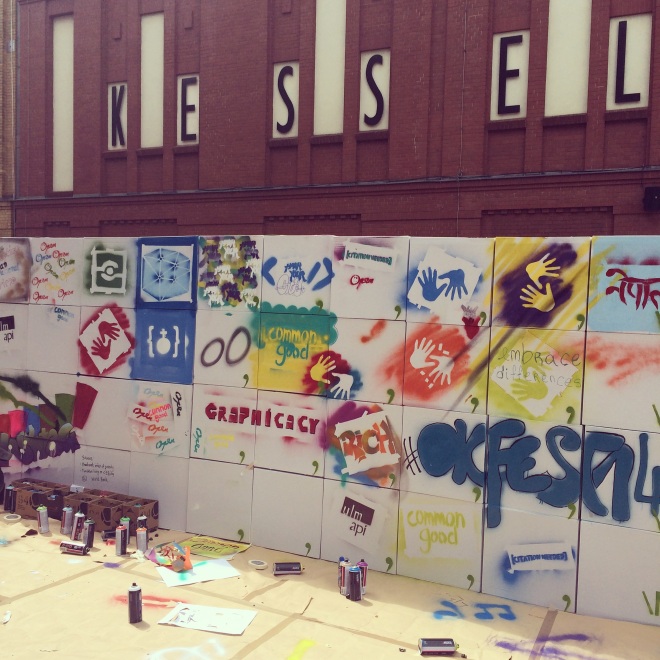I recently shared some thoughts on formats for discussion sessions at conferences and other events.
I now want to move on to consider “hands-on” styles of sessions and events, where the emphasis is on encouraging the participants to do something, rather than sit back and listen/check their email/catch up on sleep.
Again, please share your own experiences in the comments – it would be great to create a list of good examples.
i) Unconferences
What is it? The “unconference” format has become very popular over the past few years, especially in community-driven circles, where giving attendees a chance to shape the programme and discussions is a key part of the experience at the event. Unconferences typically also result in lower registration fees and less “production” of the event (i.e. simple food, little/no signage, and only basic A/V requirements).
You may see the term “unconference” being used fairly liberally these days, but my interpretation of it is that the event has no programme set in advance. A broad topic, date and venue is announced, and signups may take place, but the actual schedule is decided on the evening before the event in the pub (or equivalent). This involves various combinations of post-its, white boards, and encouragement from the organisers, resulting in a programme for the event by the end of the evening. Everyone then turns up the following day to carry this out. Some speakers may bring along talks they’ve used elsewhere, but generally these events work best with a more spontaneous approach.
Examples: SciFoo Camp, co-organised by O’Reilly and Macmillan’s Timo Hannay et al., is one of the more geeky unconferences. It’s an invite-only event that aims to bring together interesting thinkers in science and tech. I’ve co-organised two SciBarCambs (a Cambridge, UK-based science bar camp). It’s a one day event, plus an evening in the pub beforehand to put together the programme. It involves a mix of talks, demos, and debates with some socialising (dinner and more discussions) afterwards. Martin Fenner has recently shared his thoughts about unconferences – which the SpotOn London conference is adopting as the format for the 2nd of the two days of the event this year.
Suitable for: Great for community participation as the emphasis is in the hands of the attendees. Also good for creating unexpected connections where people with similar interests end up running a session together. Might be an appropriate option if you have a very limited budget or lack the editorial resources to plan a more structured event.
Tips/Ideas: Organising an event like this takes a lot of energy and enthusiasm; there’s some preparation to spread the word and possibly find sponsors, but lots of on the fly running around at the event itself. It helps to have a well-connected organising team to invite interesting participants that don’t already know each other. Try to keep any ticket costs as low as possible to facilitate attendance by a diverse group of attendees – you only need to provide simple catering and the venue.
Potential problems and other considerations: Don’t expect that by organising or sponsoring the event you’ll necessarily get a big input into the programme! Sometimes the organiser will set a broad topic for the event, but an unconference is really a great opportunity to listen to the passions and projects of a community (or at least its more vocal members). Sessions can be variable in quality and style, but the “high energy” participation and serendipitous networking aspects often results in new friendships and future collaborations on other projects.
ii) Hackdays
What is it? Until a few years ago, I’d thought of hackdays as events where those who can code get together to build a new tool over a long day or whole weekend. However, the definition now seems to be expanding to any type of event where the aim is to create solutions to particular problems through an intense day or two of in-person collaboration. Scientific publishers such as PLOS and eLife have supported hackdays, which may involve asking participants to create a new tool using the API of one of their existing products. Sometimes hackdays are pitched as competitions, where the team with the best creation at the end of the hack wins a prize.
Examples: The “Flash hacks” event led by OpenCorporates during this year’s Open Knowledge Festival; hack4ac put together by eLife and PeerJ, railsrumble (which resulted in SciCombinator), The World Science Festival hackdays, NHS hackdays.
Suitable for: Makers and anyone who likes to get creative and hands-on about problem-solving. Tends to help if you know how to code, but some hackdays don’t require this e.g. the emphasis may be on a creating a handbook or other documentation, or on participants bringing along their existing projects to find others to collaborate with.
Tips/ideas: As an organiser, the important things to provide are reliable wifi plus food and coffee so that attendees don’t need to go in search of their own. The hackday at the World Science Festival had a programme for each day where sessions of hacking were punctuated by workshops where attendees could trouble-shoot or learn new skills from each other. There were also a couple of high profile guest speakers. Think about how you might use any space that you’re considering for the hackday. The ITP venue at NYU that was used for the World Science Festival hackdays includes an open plan presentation area in the centre of the building surrounded by classrooms with glass walls and white boards so that participants can doodle their ideas around the room.
If you require attendees to download software, data or to familiarise themselves with material, then send this out at least a week in advance and encourage them to do a small amount of preparation. This ensures that everyone can hit the ground running and make the most of the limited time together.
Potential problems and other considerations: Sadly, with some hackdays the end results are never shared. This is usually because the transient connections are lost when everyone goes back to their day jobs. Do you have a plan to upload everything to a website/GitHub/collaborative documents for external input once the event is over? Who’s going to be responsible for doing this? What happens if projects aren’t finished within the timeframe of the hack? Or what if they are such a great idea that you want to continue working on them in future?
Finally, there’s concern that organisations may see hackdays as an opportunity to create new tools at low cost and outside the normal, organisational constraints. Clear, upfront communication of what the expectations are around the events and who owns the end outputs can help avoid this.
iii) Workshops within a conference
What is it? The opportunity to break up the more traditional conference format of discussion sessions with a demo of new tools or opportunity to learn a new skill. Workshops can take various formats. They may be a demo led from the front of the room, or small project groups to working on a particular task and then reconvening towards the end of the session to share with the rest of the group.
Examples: In its last couple of years, ScienceOnline ran a small number of pre-conference workshops where the focus was on longer sessions where attendees could learn more about e.g. social media metrics. We trialled workshops at SpotOn London several years ago too – teaching blogging tips, social media tools and even R programming language – with varying degrees of success! One of the workshops at Open Knowledge Festival focused on political graffiti – with a graffiti wall made from boxes that attendees could then decorate during spare moments at the event.
Tips/ideas: Running a workshop within a larger conference can be challenging and requires a lot of forward planning. Have you got all the A/V equipment and related software set up in advance? How many people can you accommodate in the workshop and do you need attendees to sign up in advance? What about time management of the session? It can help to block out the time allocated for the workshop into chunks and be realistic about what you’re going to achieve in each of them e.g. x minutes for an intro, x minutes for tool A, x minutes for an exercise with tool A and so on. Check the time regularly and be comfortable with being flexible so that you can adjust and omit sections if necessary – such as when the attendees want to delve into more detail about a particular tool or skill. Preparing good handouts with links to any tools mentioned can help anyone who wants to continue learning at home after the session.
Potential problems and other considerations: A workshop within a conference typically suffers most from time constraints. An hour or less is often not long enough to introduce participants to a new tool and allow them to gain much experience using it. And this can be made worse if previous sessions over-run. Consider blocking out an entire morning or afternoon for the workshop and be sure to remind attendees that it’s a valuable part of the programme that they’ll benefit from attending.
iv) Soapbox unconference sessions within a conference
What is it? Typically, when planning discussion sessions for conferences, speakers and topics are decided months in advance, which can leave no space for last minute topical debates that may be of interest and importance to the attendees. A soapbox unconference is when a session slot or two are deliberately left empty within the conference schedule and suggestions are taken during the conference itself about which topics the attendees want to see addressed. In some cases, there can be a session (or lunchbreak) during which people pitch their suggestions and voting occurs to select which topics make it through.
Examples: The “unfestival” at this year’s Open Knowledge Festival

Don’t forget to let attendees know about the unconference sessions! In person and online 🙂 Image credit: Data Uruguay https://www.flickr.com/photos/datauy/14517643457/in/pool-okfestival2014/
Tips/ideas: This can require quite a lot of work to organise at the conference itself so you need to allocate someone in advance to coordinate the submission of ideas, allocation of space and communication about the sessions. This could be one of the main conference organisers, or might be an interested group of trusted attendees. Announce how the unconference will work at the beginning of the event and let people know where they can submit suggestions and how they’ll be contacted if they’re invited to take part.
Potential problems and other considerations: It may be that there are particularly contentious current issues that are highly likely to be suggested as sessions. Decide in advance how best to handle this e.g. if this is a really important topic for the community, can you make time for it in the main programme and help to put together a session where a variety of voices will be heard? Lay out any constraints about what is acceptable openly – and in advance.


Pingback: All together now: Event formats for networking | Social in silico
Pingback: Morsels For The Mind – 14/11/2014 › Six Incredible Things Before Breakfast
Pingback: 2014 in blog posts | Social in silico
Pingback: Six tips for running a successful unconference – Mubashir Qasim
Pingback: Six tips for running a successful unconference – CSCCE